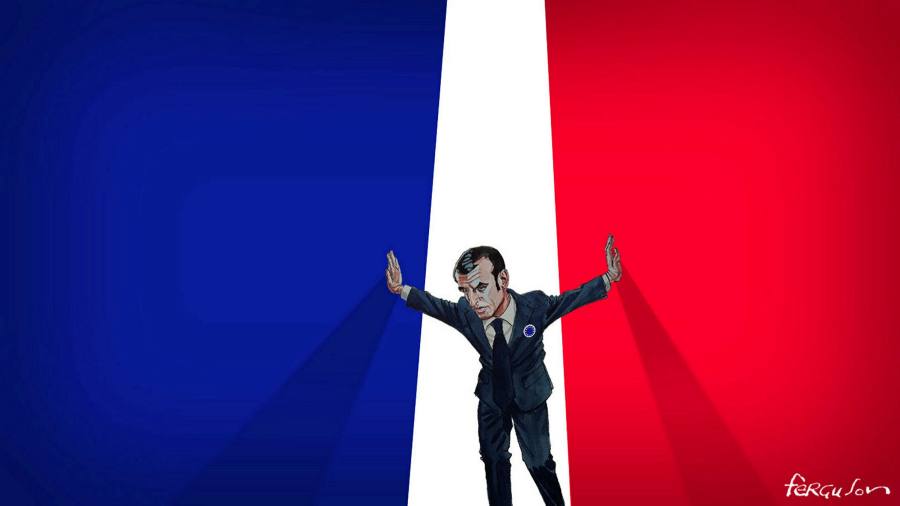[ad_1]
It was always hard to slot Emmanuel Macron into a political category. He ascended the pinnacle of the French state as a party outsider who went beyond left and right while borrowing from both. “En même temps†turned into an early trademark. Progressive on cultural issues and a critic of the over-weaning state, Macron has never been the true liberal foreigners saw or wanted to see.
Now, nearly four years into his presidency, it is harder than ever to identify the essence of Macronism. But the question of what he stands for is becoming ever more pressing. In little over a year, France will be in the midst of another polarising presidential election campaign. In all likelihood, it will end in a repeat of 2017’s run-off between Macron and the far-right leader Marine Le Pen. If November’s election was a pivotal moment for US democracy, next year’s contest will determine the fate of the Fifth Republic and probably survival of the EU if an ultranationalist like Le Pen took over the Elysée Palace.
The rematch will be closely fought. A survey by Harris Interactive published by L’Opinion last week suggested Macron would only squeak into a second-round victory in May 2022 by 53 per cent to 47 per cent.Â
Macron has recovered from the depths of unpopularity during the Yellow Vest anti-government protests of late 2018, when only 31 per cent of French voters had confidence in him. Now the figure stands at 48 per cent.Â
It is an impressive rebound. Furthermore, he is far more popular than his predecessors François Hollande and Nicolas Sarkozy were one year out from their re-election attempts. Macron’s greatest electoral strength continues to be the weakness of his mainstream opponents. No potential contender from the centre-left, centre-right or the greens looks to threaten his place in the run-off — although, in these volatile times, it cannot be excluded.
That leaves Macron limbering up for another duel with Le Pen. The contest served him well in 2017. His vision of an open, optimistic, ambitious pro-European country, and his pitch as an outsider who could smash convention and get things done, had cross-party appeal that easily trumped Le Pen’s angry nativism. But he goes into the fight as the incumbent without a clear political narrative at a time when Le Pen is adopting more mainstream positions.
In recent months, the government has shifted sharply to the right, with tough new laws on security and shoring up secular values against Islamist “separatismâ€, with hardline interior minister Gérald Darmanin even suggesting Le Pen was “softer than we could ever beâ€. Ministers have waded into the culture wars, picking fights on issues ranging from vegetarianism in school canteens to “Islamo-leftism†in universities. The aim appears to be to dissuade moderate conservatives from voting for the far-right — but it risks alienating left-leaning voters who could abstain en masse rather than back Macron in a run-off.
The president’s economic agenda, meanwhile, has been upended by the pandemic. His reform ambitions were already curtailed by the Yellow Vest protests and any dividends from earlier liberalisation have been eclipsed by the crisis. A massive relief package for workers and companies has necessarily swept aside a commitment to spending restraint. “Whatever it costs,†Macron said. The crisis, he said, was a chance “to reinvent ourselves, me above allâ€. But reinvent as what? He does not seem to know. For all the emergency aid, he is still seen as a president for the rich.
Macron has not completely abandoned his reformist credentials. The totemic scrapping of the wealth tax — to encourage investment — is not being reversed. An overhaul of unemployment insurance is still in the works. This year’s fiscal stimulus includes a hefty cut in businesses taxes, a big supply-side measure. These commitments are now overlaid by a new faith in the protective state — even though, in the pandemic, it turned out to be not as protective as many French people had expected. Dirigisme is back in fashion. Reshoring is the watchword. Foreign takeovers are unwelcome. Political control must be asserted over the economy, says finance minister Bruno Le Maire. But how convincing will the promise of protection be when pandemic support is inevitably scaled back later this year?
One consistent thread in Macron’s political offer is his pro-Europeanism. The creation of a recovery fund backed by EU borrowing was a big success. France’s presidency of the EU in the first half of next year will be a chance to push on with initiatives strongly endorsed by Paris: a reframing of fiscal rules to end the bias to austerity; laws to rein in big tech; and a tax on imports from countries that are climate laggards. It will be a chance to show Europe shaping globalisation in France’s image. It will also be framed in the language of “strategic autonomy†— the idea that Europe must take control of its own destiny and shuffle off any dependence on the US.
Is this neo-Gaullist turn Macron’s promised reset? Ever since he posed with a copy of the general’s Mémoires de Guerre for his presidential portrait, Macron has sought to invoke the spirit of de Gaulle to instil a sense of authority in his office. It is becoming ever more pronounced — a nonaligned Europe, faith in the eternal strengths of the nation and the wisdom of the state. It sounds like a nostalgic blast from the past rather than the future Macron once enthusiastically embraced.
[ad_2]
Source link





